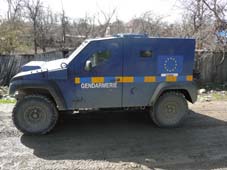Tbilisi wants EU to monitor conflict regions
By Temuri Kiguradze
Friday, June 19

“After Russia’s veto on the extension of the UN mission in Georgia our priority will be the strengthening of the EU mission and the enlargement of its mandate. Obviously this mission should be given peacekeeping and police functions,” Chair of the Parliamentary Committee on Foreign Relations Akaki Minashvili told journalists after a session of this committee on Thursday. The statement was made after a meeting between MPs and the head of the Georgian Foreign Ministry’s International Organisations Department Sergi Kapanadze.
“The positive element of the EU is that Russia is not a member of this organisation and has got no veto right there. This means Russia has no legal influence over it, and that’s why all the efforts of Georgian diplomacy and our partners will be directed towards strengthening the EUMM,” stated Minashvili.
The necessity of the international observers working in the conflict regions was mentioned in the EU-mediated ceasefire signed in August 2008 and later confirmed at a meeting between the Russian and French Presidents. The EU Monitoring Mission (EUMM) has been operating since October 2008, but despite the fact that the mandate of the mission covers the whole of Georgia’s territory, the separatist authorities and Russian troops have not allowed EUMM to operate in Abkhazia and South Ossetia. “If Russia refuses to let the EU observers into the occupied areas it will violate international law,” stated the Chair of the Parliamentary Committee on Eurointegration Davit Darchaishvili.
By vetoing the prolongation of the UN mission in Georgia at the UN Security Council on June 15, Russia eliminated the last international observer mission in the Georgian conflict regions. Several months earlier the Kremlin had blocked the extension of the OSCE mission in Georgia. Moscow claims that these international organisations have not accepted the “new realities” created in the Georgian breakaway regions since their recognition as ‘independent states’ by Russia. Russia demanded separate observing missions for each region, not connected with the Georgian missions from both the OSCE and UN. “We faced a refusal to recognise the new political and juridical situation in the region, and this may bring a new wave of instability,” stated the Russian Foreign Ministry on June 17, commenting on the decision of the UN Security Council.
Meanwhile Russia is conducting large scale military exercises near the border with Georgia. Russian troops deployed in Abkhazia and South Ossetia and described as occupation forces by the Georgian Government will be among those taking part in the trainings, entitled Kavkaz-2009. “Today the Russian military bases deployed on the territories of these republics are absolutely combat-ready units, which are capable of fulfilling any tasks to protect the peaceful population against possible terrorist acts or direct aggression,” stated General Vladimir Boldyrev, commander of Russian land forces, as quoted by the Russian Interfax news agency on June 18.
